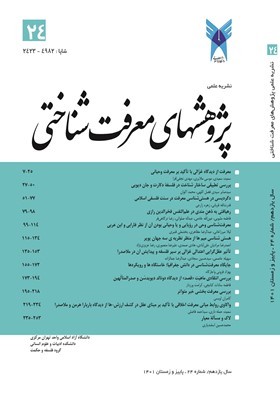واکاوی روابط مبانی معرفت اخلاقی با تأکید بر مبنای عقل در کشف ارزشها از دیدگاه باربارا هرمن و ملاصدرا
محورهای موضوعی : پژوهشهای معرفت شناختی
سعیده حمله داری
1
*
![]() ,
سید احمد فاضلی
2
,
سید احمد فاضلی
2
1 - دانشجوی دکتری فلسفه اخلاق، دانشگاه قم
2 - استادیار گروه فلسفه اخلاق، دانشکده علوم انسانی، دانشگاه قم؛
کلید واژه: عقل, ملاصدرا, روابط مبانی معرفت اخلاقی, کشف ارزشها, باربارا هرمن,
چکیده مقاله :
یکی از مهم ترین موضوعات حوزه معرفت شناسی اخلاق، گفتگو در باب مبانی است. گرچه هر یک از عوامل میل، انگیزه، غایات الزامی، عواطف، وحی و شهود به عنوان مبنای معرفت اخلاقی شناخته شده اند اما همواره توجه خاصی معطوف مبنای عقل بوده است. بااین وصف، اگر میزان تأثیر عقل در کشف ارزش های اخلاقی از یک سو و سایرمبانی از سوی دیگر مورد سنجش قرارگیرد نحوه تأثیر هریک از مبانی مذکور چگونه خواهد بود و چه روابطی میان این مبانی معرفتی با مبنای عقل می توان تصور نمود؟ باربارا هرمن فیلسوف آمریکایی و ملاصدرا از آراء قابل تأملی در تبیین این مسئله برخوردارند لذا بررسی دیدگاه آنها حائز اهمیت و ضروری بود. پژوهش به روش توصیفی- تحلیلی و با استفاده از تحلیل متن صورت گرفته و یافته ها نشان داد با فرض سایر مبانی معرفت اخلاقی در کنار عقل سه رابطه متفاوت می توان استخراج نمود. هر دو متفکر مدعی بودند میل، انگیزه و غایات واجب، از جمله مبانی نیازمند و وابسته به عقل اند لذا با عقل رابطه اثرپذیری دارند. ملاصدرا مبانی وحی و شهود را پشتیبان عقل می دانست پس رابطه وحی و شهود با عقل از نوع رابطه اثرگذاری تلقی شد و نهایتا هرمن عواطف را نه پشتیبان عقل و نه به آن وابسته بلکه مبنایی کاملا مستقل از عقل می دانست ازاین رو دو مبنای عواطف و عقل در یک رابطه مستقل قرارگرفتند.
One of the most important topics in the field of moral epistemology is the discussion about "foundations". Although each of the factors of desire, motivation, mandatory ends, emotions, revelation and intuition are known as the basis of moral knowledge, special attention has always been focused on the basis of reason. However, if the influence of reason in discovering moral values is measured on the one hand and other bases on the other hand, how will the influence of each of the mentioned bases be and what relationships can be imagined between these knowledge bases and the basis of reason? Barbara Herman, an American philosopher, and Mulla Sadra have considerable opinions in explaining this issue, so it was important and necessary to examine their views. The research was carried out by descriptive-analytical method and using text analysis and the findings showed that assuming other bases of moral knowledge besides reason, three different relationships were extracted between them. Both thinkers claimed that desire, motivation, and obligatory ends, among other things, are necessary and dependent on reason, therefore, they have an "efficacy" relationship with reason. Considering that Mulla Sadra considered the foundations of revelation and intuition to be the support of reason, the relationship of revelation and intuition with reason was considered to be of the type of "effect" relationship, and finally, Herman claimed that emotions are neither the support of reason nor dependent on it, but a complete basis. It is independent, therefore emotions and reason were placed in an "independent" relationship.
دباغ، سروش. (1392). درس گفتارهایی در فلسفه اخلاق، تهران: صراط.
دهقان سیمکانی، رحیم. (۱۳۹۰). کاربرد عقل در اخلاق از منظر ملاصدرا و عبدالجبار معتزلی، قم: دانشگاه قم.
دیوانی، امیر.(1377). زبان اخلاق از دیدگاه توصیهگرایی، نشریه نقد و نظر، صص185-166، شماره 1 و 2.
شجاعیان، زهرا. (۱۳۹۴). بررسی تطبیقی مبانی معرفت شناختی اخلاقی امام غزالی و ملاصدرا، قم: دانشگاه قم.
صدرالدین شیرازی، محمد. (1360). اسرار الآیات. مصحح: محمد خواجوی، تهران: انجمن حکمت و فلسفه ایران.
همو. (1368). الحکمه المتعالیه فی الاسفار الاربعه، تهران: حیدری.
همو. (a1366). شرح اصول کافی، کتاب عقل و جهل، ج 1، مترجم: محمد خواجوی، تهران: موسسه مطالعات و تحقیقات فرهنگی وابسته به وزارت فرهنگ و آموزش عالی.
همو. (b1366). شواهد الربوبیه، ترجمه و شرح: جواد مصلح، تهران: انتشارات سروش.
همو. (1374). رساله سه اصل، مصحح: دکتر سیدحسیننصر، به اهتمام محمدرضا.
طاهریان دهکردی، بتول. (۱۳۹۷). بررسی تطبیقی مبانی نظری اخلاقی خواجه نصیرالدین طوسی، امام محمد غزالی و صدرالمتألهین، قم: دانشگاه پیام نور قم.
علیا، مسعود. (1391). فرهنگ توصیفی فلسفه اخلاق، تهران: هرمس.
Herman, B. (1991). "Agency, Attachment, and DifferenceAuthor(s)". Ethics, (101), pp. 775-797, The University of Chicago PressStable
Herman, B. (2011). Embracing Kant's Formalism. Kantian Review, 16, pp 49-66
Herman, B. (2018). "Other to Self, Finding Love on The Path to Moral Agency"
Herman, B. (2007). Moral Literacy, Harward university prees.
Reath, A. (2011). "Will, Obligatory Ends and the Completion of Practical Reason: Comments on Barbara Herman's Moral Literacy", Kantian Review (16), pp 1–15
Stephen engstrom, E & Whiting, J. (1994). Aristotle, Kant, and the Stoics Rethinking Happiness and Duty. University of Pittsburgh.
Wilson, D. (2009). "Moral Deliberation and Desire Development: Herman on Alienation", Canadian Journal of Philosophy, 39:2, PP 283-308
_||_

